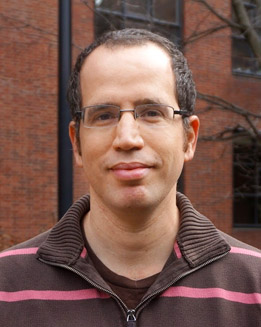
I joined the Lautenberg Center for Immunology and Cancer Research at the Hebrew University’s Faculty of Medicine in January 2019. This brought me full circle back to where my academic journey began, as an undergraduate and a master student in mathematics and theoretical computer science at the Hebrew University. From there, I continued to the Weizmann Institute for a doctorate in cancer genomics with Prof. Eytan Domany. To complete my transition into the biomedical sciences, I travelled to Boston where I worked on cancer epigenetics with Prof. Bradley Bernstein, as a post-doctoral fellow at the Broad Institute, Massachusetts General Hospital and Harvard Medical School.
Despite amazing progress in mapping and understanding of mutations in genes and their role in drive cancer, we often still cannot explain what drives a given tumor. I believe that much of this unexplained oncogenicity lies in genetic and epigenetic changes of non-genic DNA regions, and that uncovering them is crucial for understanding cancer. Indeed, almost all of our DNA does not code for genes, but many of these non-genic sequences regulate DNA related processes, such as transcription, replication and the 3-D structure of the chromosomes. Aberrations in these regulatory elements can cause cancer as we have recently demonstrated, but the extent and mechanisms of action remains elusive. We discovered a few examples of oncogenic alterations of non-genic regions, including- a new mechanism in which epigenetic changes lead to aberrant 3-D DNA structure that causes cancer [1,2], genetic translocations that rewire transcriptional regulation [3,4], and new regulatory subtypes of neuroendocrine tumors [5]. This led to suggesting new therapeutic approaches for gastrointestinal stromal tumors, adenoid cystic carcinoma and pancreatic neuroendocrine tumors.
My lab at the Hebrew University aims to systematically uncover the role of genetic and epigenetic alterations in non-genic regulatory DNA in cancer. We do this by taking an integrative approach that combines controlled experiments in cancer models with analysis of tumor samples from patients, via cutting edge experimental techniques and big-data analytical approaches. We study basic questions on the function of non-genic regulatory elements and chromosomal structure, and more clinically relevant questions on alteration that drive different cancers. We use these insights to identify new biomarkers and drug targets, and to develop algorithms to predict the course of the disease and help guide treatment plans for cancer patients.
- Flavahan WA*, Drier Y*§, Johnstone S, Tarjan D, Hegazi E, Shareef SJ, Javed NM, Raut CP, Eschle BK, Gokhale PC, Hornick JL, Sicinska ET, Demetri GD§, Bernstein BE§. Altered chromosomal topology drives oncogenic programs in SDH-deficient GISTs. Nature 2019, Accepted. * Equal Authorship, § corresponding author.
- Flavahan WA*, Drier Y*, Liau BB, Gillespie SM, Venteicher AS, Stemmer-Rachamimov AO, Suvà ML, Bernstein BE: Insulator dysfunction and oncogene activation in IDH mutant gliomas. Nature 2016, 529(7584):110-4. * Equal Authorship.
- Drier Y, Cotton MJ, Williamson KE, Gillespie SM, Ryan RJ, Kluk MJ, Carey CD, Rodig SJ, Sholl LM, Afrogheh AH, Faquin WC, Queimado L, Qi J, Wick MJ, El-Naggar AK, Bradner JE, Moskaluk CA, Aster JC, Knoechel B, Bernstein BE: An oncogenic MYB feedback loop drives alternate cell fates in adenoid cystic carcinoma. Nature Genetics 2016, 48(3):265-272.
- Ryan RJ*, Drier Y*, Whitton H, Cotton MJ, Kaur J, Issner R, Gillespie S, Epstein CB, Nardi V, Sohani AR, Hochberg EP, Bernstein BE: Detection of Enhancer-Associated Rearrangements Reveals Mechanisms of Oncogene Dysregulation in B-cell Lymphoma. Cancer discovery 2015, 5:1058-1071. * Equal Authorship.
- Cejas P*, Drier Y*§, Dreijerink KMA, Brosens LAA, Deshpande V, Epstein CB, Conemans EB, Morsink FHM, Graham MK, Valk GD, Vriens MR, Fernandez-del Castillo C, Ferrone C, Adar T, Bowden M, Whitton HJ, Da Silva A, Font-Tello A, Long HW, Gaskell E, Shoresh N, Heaphy CM, Sicinska E, Kulke MH, Chung DC, Bernstein BE§, Shivdasani RA§. Enhancer signatures stratify and predict outcomes of non-functional pancreatic neuroendocrine tumors. Nature Medicine 2019, 25(8):1260-1265. * Equal Authorship, § corresponding author.

